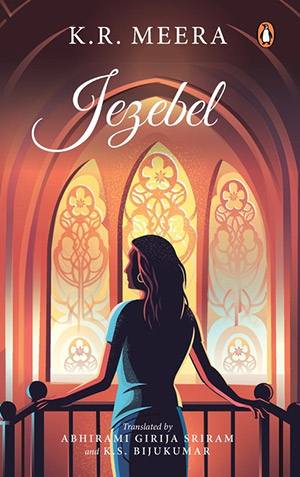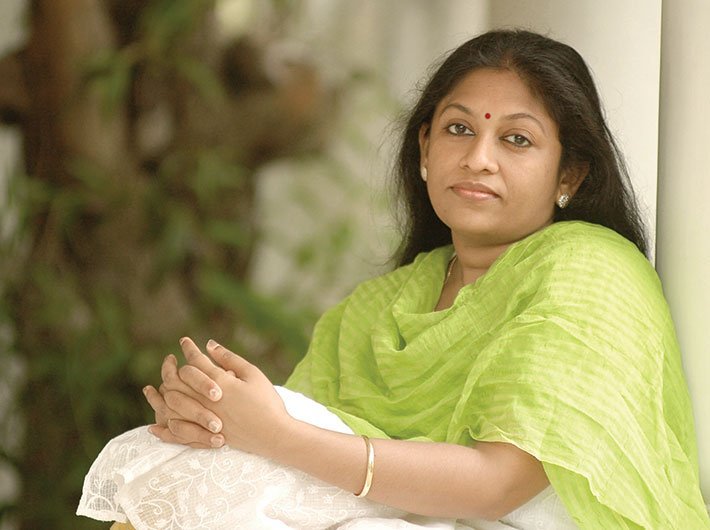This feminist novel resorts to tricks of popular narratives to create an unputdownable story for a larger readership
Jezebel
By K.R. Meera
(Translated from the Malayalam by Abhirami Girija Sriram and K.S. Bijukumar)
Hamish Hamilton, 400 pages, Rs 599
‘Jezebel’, K.R. Meera’s latest novel to be published in English, has two things going for it – feminism and a compulsive narrative. In between, a predilection for melodrama leaves no scope for nuances. A lively soap opera that would be highly popular is what this novel aims to be.
 That, however, is not intended as a charge against the novel. Indeed, Meera could be charting a new territory in making intentional and careful use of the ingredients from popular narrative structures to draw the attention of indifferent bystanders and engage them in a difficult conversation.
That, however, is not intended as a charge against the novel. Indeed, Meera could be charting a new territory in making intentional and careful use of the ingredients from popular narrative structures to draw the attention of indifferent bystanders and engage them in a difficult conversation.
The novel itself confesses the soap opera part: “John’s wedding was a frugal affair. George Jerome Marakkaran stood ramrod stiff, hands clasped behind his back, chin tilted up at a hundred-and-twenty degrees. In his sandalwood-coloured silk jibba and gold-bordered mundu, he looked every bit the father in television serials.” He is no exception; almost all characters and situations befit TV serials. There are no surprises, no nuances, no gray between black and white.
Before ‘Sooryane Aninja Oru Sthree’ was published in 2018, the Malayalam author had given the gist of it in these words: “The book tells a story of the conflict between a woman, her body, family, the church and the law. The title is from ‘Woman Clothed in Sun’ in the Bible’s Book of Revelation.” (Read a short conversation with Meera from 2016: https://www.governancenow.com/news/regular-story/conversation-writer-kr-meera)
Jezebel, a young doctor, has all the joys and happiness of her life taken away from her when she marries the wrong man. He might have his own reasons for being morose, but he does not even once show any affection towards her. His father, straight from TV serials, is only worse. Mother-in-law, however, is kind-hearted even if meek, and she too sticks to those adjectives till the end. Jezebel’s parents, too, are characters who refuse to come out of clichés. The result is a series of unfortunate events, and they all end up in a family court for divorce.
The court hearings frame the narrative, with the (very filmy) lawyer’s dramatic queries triggering flashbacks, each a tale of blood-curdling misery, shocking injustice or unbearable trauma – a veritable catalogue of the woes of a half of the world even in this day and age. Each ordeal leads the reader to the next in a highly skilfully woven narrative that becomes unputdownable after the opening.
That, arguably, is what Meera is aiming for, getting every reader to care for the fate of the characters no matter how stereotypical they might be. Indeed, their being stereotypes helps in making the story universal, whereas nuances and specifics might have pulled the project in the other direction.
Jezebel’s travails unfold at a fiery pace, aided by smooth prose. The translation by Abhirami Girija Sriram and K.S. Bijukumar has not a single jarring note; and choice of right words, especially verbs, makes the writing supple.
While Meera’s story-telling abilities are way above average, the simplistic treatment may mar the reading experience for a few readers. Paradoxically, that is what may compel the kind of readers who don’t bother about ‘feminism’ and ‘patriarchy’ to keep reading this novel till the end, and even think through it.
Orwell (via G.K. Chesterton) called ‘Uncle Tom’s Cabin’ a “good bad book” – “the kind of book that has no literary pretensions but which remains readable when more serious productions have perished”. Jezebel is not bad, it’s a very good somewhat-above-average book.
